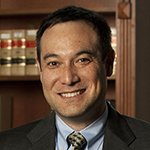The Supreme Court is expected to rule this spring on whether prayers before town hall meetings violate the First Amendment clause that prohibits the establishment of religion.
In Town of Greece v. Galloway, two local citizens of the New York town who frequently attended board meetings are arguing that the opening prayers at these meetings left them, as non-Christians, feeling coerced to participate and isolated. The town has responded that anyone, regardless of faith tradition or beliefs, could volunteer to recite a prayer and there was never any intentional exclusion.

John Inazu, a First Amendment expert and professor of law at Washington University in St. Louis, highlights one dimension of the litigation often unaddressed by commentators: what he calls the “mistakes of the past, present and future” adopted by proponents of legislative prayer.
The mistake of the past refers to “the nostalgic impulse to return to an earlier era of religiously infused political life,” he says. “As prominent American religious historians have stated, ‘early America does not deserve to be uniquely, distinctly or even predominantly Christian, if we mean by the word ‘Christian’ a state of society reflecting the ideals presented in Scripture.’”
Inazu says the mistake of the present is ascribing greater significance to the presence of religious language than to the context in which the language is used.
He uses the example of the 2010 remake of the 1985 song We Are the World, which sparked outrage for omitting a line mentioning God in the original. “While several people angrily commented that the remake showed a movement away from God, they did not seem to know that the original line – stating God turned stone to bread – is actually heresy,” he says. “The commentators cared more about having God’s name in the song than having it used in correct context.”
Finally, Inazu describes the mistake of the future as using too much energy on legislative prayer battles and distracting from other priorities. “Religious believers who expend political capital and litigation resources to preserve civic rituals and secular liturgies may be doing so at the cost of ignoring far more direct threats to the freedom of the church,” he says.
“In the end, the church should be asking what it would benefit from such a case, as it can flourish without such entanglements.”
A decision in Town of Greece v. Galloway is expected by June 2014.